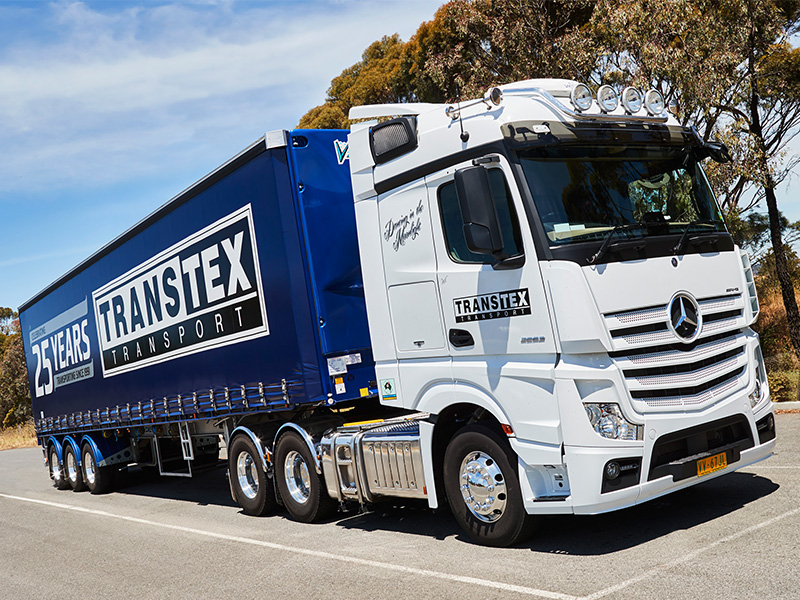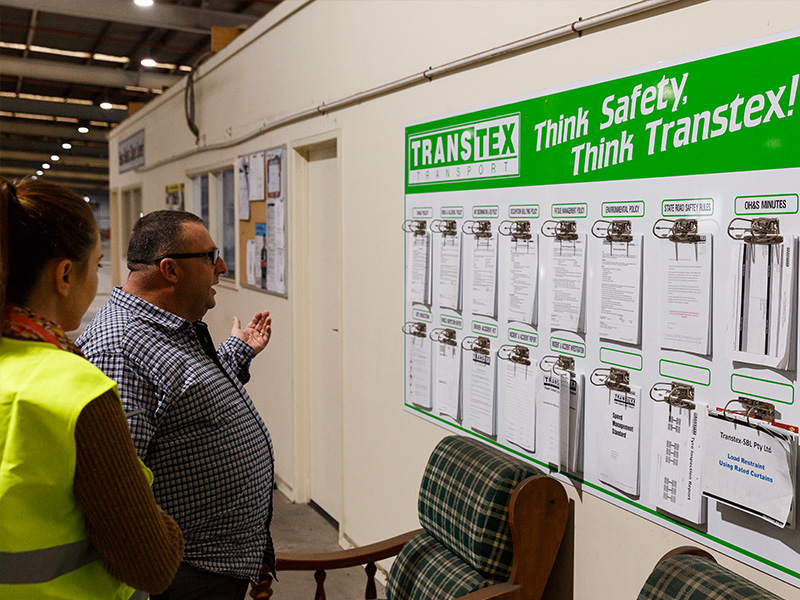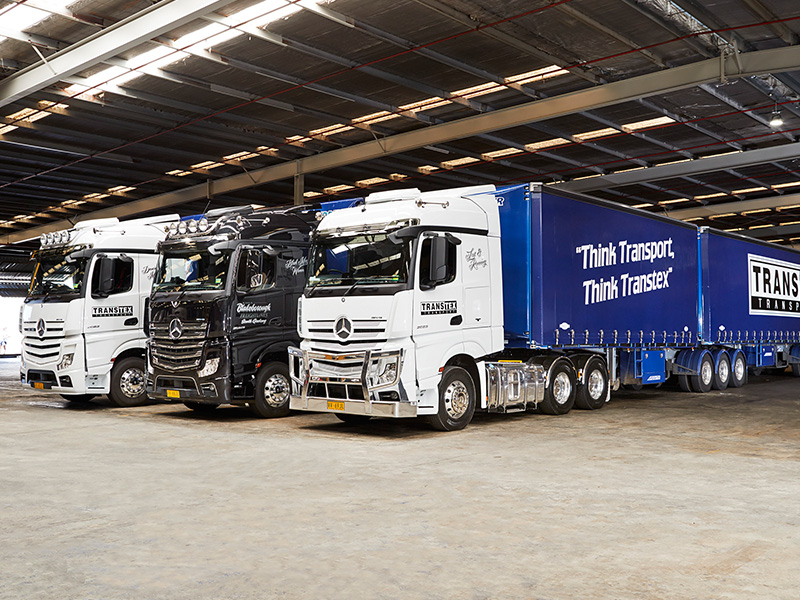With efficiency and safety in mind, Blakeborough has invested in eight new Mercedes-Benz trucks
Transtex Transport director Shane Blakeborough doesn’t think twice when asked what safety means to him.
The father of three values the well-being of his drivers more than profits – so much so that he’s got rid of the $4 million flat-top side of business, one servicing general construction and oil and gas sectors, due to safety risks.
Despite losing 25 customers as part of that decision, Blakeborough is adamant that every driver should return home from work.
“The chain of responsibility as far as worker’s safety and risk are concerned were too high, it was difficult for a driver to be on top of a trailer and load them, tying them down and chaining, there were just too many OH&S issues and we just felt that the risk to our employees and ourselves didn’t match the return,” Blakeborough says.
“How do I explain to a wife and kids that dad’s hurt himself at work because the place didn’t provide access to climb on top of the vehicle?
“The reputation of our drivers is more important; we were uncomfortable with the fact that you’d load in a place where they’d say drive out the road and pull up and you can tarp it up on the street because you can’t do it here and that’s alright because you’re not on their property anymore.”
With a safer and less stressful journey in mind, Blakeborough has turned to the new range of Mercedes-Benz Actros family of trucks.
Initially hesitant to take on a Mercedes-Benz truck due to a preference for American and Japanese metal, Blakeborough is now a convert, describing the Actros 2663 model, 6×4 prime mover as a “game changer”.
Having worked closely with the manufacturer during an intense six-month test program, Blakeborough was impressed with enhanced fuel economy.
“We were previously running B-doubles and were getting between 1.5 and 1.6 kilometres a litre to running this new Mercedes-Benz truck that was doing 2 to 2.2 (kilometres) and in some cases on a single trailer operation we were getting over three kilometres a litre.
“When we talk about some of our B-doubles on our linehaul, we’re saving $1,000 a week on fuel.”
Drivers were pretty welcoming of the range too, with the new models likely to require oil changes at intervals of around 70,000km.
They also have the potential to run for longer depending on the operating conditions.
Transtex now has eight Actros 2663 model trucks – a decision that took some persuasion – with another 10 on the way.
“I actually went into that kicking and fighting because Mercedes-Benz came and said ‘we want to get Mercedes-Benz into your business’ and I said ‘I don’t think that’s ever going to happen’.
“Because I drive a little bit myself still I did a trip away in one and I went ‘Wow, how good is this?’
The model comes with the premium 2.5 metre wide cab and is powered by the 15.6 litre OM473 engine.
The Mercedes-Benz fleet is on a maintenance contract.
With more than 25 years in the general freight business, Transtex has 75 vehicles ranging from utes and vans to B-doubles including Japanese fleet of Fuso and Hino that is used for local distribution in Victoria.
It is maintained by six in-house mechanics and tyre fitters, with trucks fully GPS tracked.
The company also offers complete warehousing and transport solutions for both short and long term storage requirements across its five national depots, with headquarters based in Geelong.
Name change
Originally called Shane Blakeborough Logistics (SBL), Blakeborough changed the name of his five-year-old company when he took over Geelong’s Transtex Transport three years ago.
With transport in his blood, Blakeborough joined a crane hire company at the age of 16 and by 22 he went into his own business, operating several truck mounted cranes in Geelong by 1980s.
He then got out of the crane business and started driving trucks for others, including Linfox at Anglesea.
By 1994, he set up his own company called Journey Management, a registered training organisation delivering training to road transport, logistics and civil construction, becoming one of the largest privately-owned truck training facilities in Australia.
Blakeborough then decided to follow his grass roots and return to transport, buying out family-owned ANR transport in Geelong in 2012, and the three trucks.
That’s when SBL was born, which was later renamed to Transtex following the 2014 takeover.
The company has 130 drivers and some 3,000 customers, mainly within manufacturing.
It delivers regionally across Australia and acts as an end-forwarder for other transport companies.
Transtex works closely with its customers for efficiency and safety but is not swayed by price, having this year lost three big clients due to overly tight delivery timeframes.
“We don’t run two-up trucks, we don’t believe the driver can get a good enough break when he’s in the bunker asleep while his mate is driving,” Blakeborough says.
“Most customers today understand the level of chain of responsibility and build their business around that but the problem with our country today is massively adjusting time – we used to manufacture a lot and we don’t anymore, everything comes into Australia in containers and is then pick-packed and sorted for distribution.
“The problem is that nobody wants to pre-plan like they used to and we see this quite regularly where we’d go to the same place every five days a week and we’re delivering from the same company and it is that the company might have bought 10 pallets today, four pallets tomorrow and three pallets on Wednesday.
“It’s about the supply levels and so they try to have minimum amount of stock on floor.
“A lot of customers today are smaller orders than they used to be but they’re more frequent.”
Opportunities
With the Transtex takeover came the naming of his own trucks, having personalised a handful of Kenworth vehicles.
“This was about building a brand, the Transtex banner was about us – a brand name that fitted our advertising banners and our advertising banners on our trailers,” he says.
“Transtex fitted those trailers extremely well – it was about one business, one team, and Transtex is what it’s all about – it’s not about me.”
The industry has changed dramatically following the Transtex takeover according to Blakeborough, who considers his company to be a level three player.
“What I’m noticing now is that transport freight handling businesses that want to move their freight are dealing now with level threes a lot more than they were dealing in the last three to four years,” he says.
“I think it’s because level three players like us have invested in infrastructure and technology, including people.
“We’re at a point at the moment where we’re able to take a customer’s need and react quicker to them.
“We can react to a customer’s need quicker than a level one player in the business can and we can restructure or move and set up quicker than a lever two can.
“I think everyone wants to aspire to be on level one or two and I believe that Transtex over the next five years has the ability to be a level two player in the business.”
Read the full feature in the July edition of ATN. Subscribe now.





